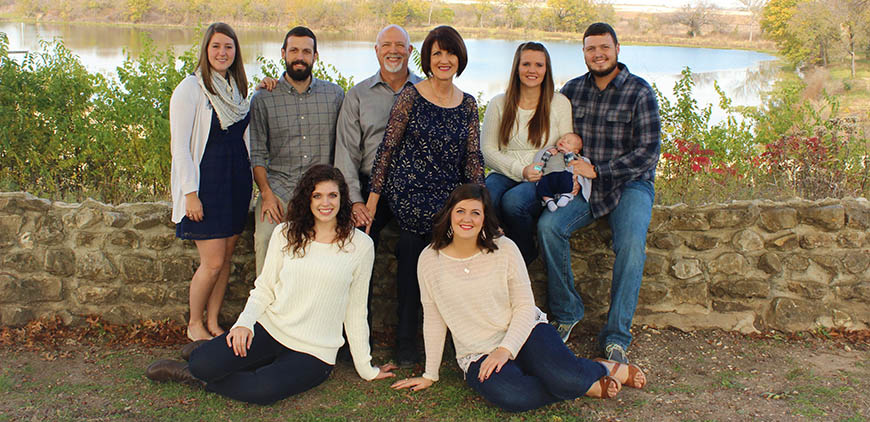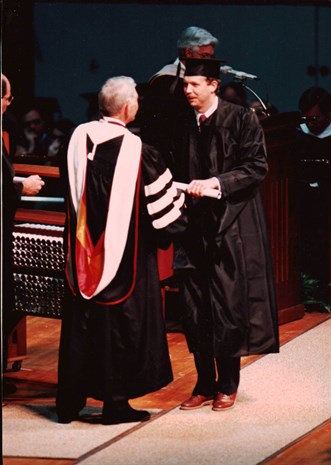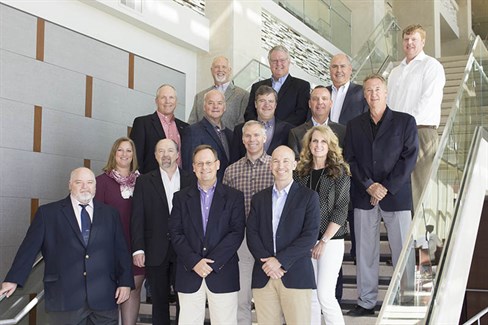
There are certain defining moments in life – events that mold us into the individuals we continue to grow to become. Brent Lyon, chairman of the Department of Industrial and Systems Engineering Advisory Council at Texas A&M University, recounted several that have shaped his life and career.
Lyon knew from an early age he was not cut out for a repetitive job and wanted a career that required more mental work, rather than physical.
“I had worked some jobs as a teenager where minutes seemed like hours and my mind was continuously wandering, and others where I was mentally engaged doing something interesting,” Lyon said. “For me, the contrast was significant.”
Lyon began his academic career as a computing science major, but quickly realized this was not the career path he had always envisioned.
“At the end of that first spring semester, I moved back home for the summer,” Lyon said. “On the drive back to Fort Worth, I had a very rational and critical self-conversion where I realized that some of my natural tendencies and talents were not in line with my chosen major. By the end of that drive home, I decided to not only get out of computing science, but to begin a major in industrial engineering. It was a natural fit for me.”
Lyon realized he had an attraction to the making and manufacturing of things, was naturally wired to seek out the most efficient means of accomplishing a process and had a creative curiosity about the world around him. He went on to serve as president of the American Institute of Industrial Engineers student chapter, now the Institute of Industrial and Systems Engineers (IISE) student chapter.
 Shortly after graduation, Lyon was asked a question posed to most new graduates “What’s one of the main things you learned in school?” He quickly answered that he learned how easy it was to be wrong.
Shortly after graduation, Lyon was asked a question posed to most new graduates “What’s one of the main things you learned in school?” He quickly answered that he learned how easy it was to be wrong.
As an undergraduate student, Lyon learned how small or simple math mistakes made early in a series of calculations could create a massive error in the end number or conclusion and how an assumption based on his own knowledge, without any real data or having worked through the details of whatever it was, could end in such great error.
“Having been conscious of how easily I could be wrong, without realizing it, I had caused myself to not be very confident in my opinions, comments or conclusions,” he said. “It took me years to gain that confidence in myself and my thought processes. I wish I had known early on that an understanding of the risk for error is not the same as being confident in yourself.”
Lyon was also wrong in what he thought a perfect marriage for him would include and look like. Sometimes, being wrong works out better than being right.
“I remember the day at the MSC bookstore backpack drop-off when I accused the cute young lady working there of having looked in my backpack when she asked, ‘It’s Brent, isn’t it?’” Lyon said. “She claimed we’d met a month or so prior. I still think she looked in my backpack.”
Within a year, he would be engaged to marry that girl from the bookstore.
“When I was in school, I was convinced that I would end up marrying an engineer,” Lyon said. “Three months before I graduated, I met an agricultural journalism major. On our second date, the word marriage entered our conversation, and within six weeks, our engagement was official. She is no engineer, but I did get that exceptional, model marriage that just clicks. We’ve been married over 30 years now. My marriage to Jane is my greatest accomplishment.”
Upon graduating, Lyon accepted a job offer with Halliburton Services in Palestine, Texas, as a field engineer-in-training. Unfortunately, his graduation was perfectly timed with the collapse of the oil industry in the 1980s. His six-month training program quickly turned into an indefinite program.
“Working for Halliburton was very difficult for me,” Lyon said. “I can still be caught saying, there are 168 hours in a week, and you can work them all. That was a comment I learned all too well, even if 160 of those hours were spent sitting in a truck waiting to do eight hours of work.”
He also quickly learned that things could always be harder or worse. His days at Halliburton taught him to have a sense of gratitude that has remained with him to this day.
“After eight or nine months, I was laid off,” Lyon said. “There were three people in the room when that happened and I was the only one smiling. That was four weeks before my wedding in Bryan, so I moved back to College Station and got a gap job framing houses, learning skills I’ve used my entire life.”
During this time between permanent jobs, the thought of graduate school entered Lyon’s mind. With a bit of encouragement from a special mentor, he decided to continue his education in industrial and systems engineering.
“One of my greatest mentors was Dr. Jim Hennigan and I made the mistake in those weeks right after my wedding of coming up and visiting him on campus,” Lyon said. “It was partly for myself, and largely for a man who had been a mentor and someone we all admired, that I found myself in graduate school.”
Lyon decided to take Hennigan’s advice and further his education with a master’s degree in industrial engineering, but he wanted to do it right.
“I was, and am, naturally the kind of guy who is comfortable standing along the wall at a party watching without interacting with anyone else,” Lyon said. “So, as a personal prerequisite for entering grad school, I purposed that I would always have to sit on the front row as to be more engaged with the professor and to not be intimidated by anyone else.
“It worked, I was much more engaged. I often purpose with intent to sit on the front row, no matter how uncomfortable I am walking in front of everyone else to get there.”
During his graduate studies, Lyon was also a teaching assistant in the engineering technology department.

Upon completing his master’s degree in a year and a half, Lyon entered the aerospace and defense industry at General Dynamics in Fort Worth, Texas, which is now a Lockheed Martin Facility.
“In my 31-year career at Lockheed Martin, everything I have done would fall under the academic banner of industrial engineering,” Lyon said. “I did a lot of information systems design work in the early days of manufacturing resource planning in our industry and I’ve done just a lot of projects in ‘fix-it’ and ‘make things better’ kinds of things. Then in the last 12 years, I have actually been the senior manager over the industrial engineering function for the aeronautics line of business within Lockheed Martin.”
From the beginning of his career, Lyon carefully guarded the time he had with his family and was diligent in not letting the job take over his life.
“When I was a young man, I once heard Dr. James Dobson say that of all the people he had counseled on their death beds, not one of them ever said they wished they had worked more or made more money, but many of them wished they had spent more time with their family and had better relationships with them,” Lyon said. “As a young man, I set my goals where work and professional achievement would not come at the expense of my family.”
Most proud of the difference he has made in the world around him, Lyon takes great satisfaction in considering himself a giver.
“Often I told my kids when they were growing up that there are two basic types of people: givers and takers,” Lyon said. “I always admonished them to be givers. That, too, is something I purposed for my life as a young man.”
The famous Aggie ring is Lyon’s prized possession, like most former students. After all, “Once an Aggie, always an Aggie.”
“We have my father-in-law’s ring from the class of 1939 and my mother-in-law’s ‘sweetheart’ Aggie ring from the same time and they are held in great value by our family,” Lyon said. “In addition to the Aggie rings belonging to my wife and myself, two of our four children have their own Aggie rings, as well as our daughter-in-law.”
Lyon advises current students to identify things they really enjoy doing and things they are naturally “wired” for, while discovering how they define success.
“Try to find a career that fits those answers,” he said. “In addition to those, realize that relationships are the keys to success. Don’t ever sacrifice them.”
In addition to finding the right career for him, Lyon is passionate about serving the community in which he lives and the industry in which he works. In his local community, he served on the school board for two terms and as president of the board his last two years. He serves his religious community as a member of the Elder Board in the church. He also continues to serve the manufacturing industry as a site examiner of applicants for the Shingo Prize for Excellence in Manufacturing award from the Shingo Institute. Finally, in recent years, he has rekindled an early interest in physics and spends part of his time studying topics in quantum mechanics.
“For me, it’s less about what I get and more about what I give,” Lyon said. “What makes a difference to the world around you and to the people you love is the good that you do, character matters.”

Today, Lyon serves as the chairman of the industrial and systems engineering advisory council. The entire council dedicates its time and resources to make the industrial and systems engineering department, the college of engineering and Texas A&M the very best they can be.
“I think that we members of the council have much to give to the department from many years in industry,” Lyon said. “A career in industry and one in academia are very different. I think by having an active advisory council who has some understanding of academia, both the department and the faculty can benefit from the relationships and interactions.”